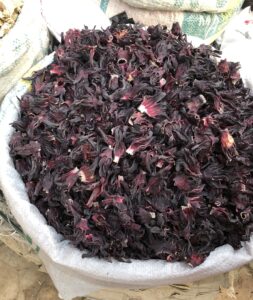Efo leaves, also known as African spinach or green leafy vegetables, hold significant cultural, culinary, and nutritional importance across various African regions. These leaves, rich in nutrients and versatility, play a crucial role in traditional dishes and dietary practices.
Efo leaves encompass a variety of leafy greens, including but not limited to amaranth, spinach, and kale. They’re renowned for their vibrant green color, distinct flavor, and their ability to complement a wide array of dishes. The leaves are commonly cultivated and harvested for their culinary use, and their popularity extends beyond Africa to diaspora communities globally.
Nutritionally, efo leaves are a powerhouse of essential vitamins, minerals, and antioxidants. They’re a great source of vitamins A, C, and K, providing a boost to the immune system, promoting healthy vision, and aiding in blood clotting. Additionally, they contain vital minerals like iron, calcium, and potassium, essential for maintaining bone health, muscle function, and overall well-being.
In traditional African cuisine, efo leaves are a staple ingredient in many dishes. They’re often used in soups, stews, and sauces, where their unique flavor enhances the overall taste profile. For instance, in Nigerian cuisine, efo riro, a flavorful stew made with assorted meats, palm oil, peppers, and efo leaves, is a cherished delicacy appreciated for its rich taste and nutritional value. Similarly, in Ghana, efo leaves are commonly used in preparing dishes like Kontomire stew, where the leaves are stewed with various ingredients to create a savory meal.
Beyond their culinary significance, efo leaves hold cultural importance within African communities. They’re often associated with gatherings, celebrations, and communal meals, symbolizing unity and shared heritage. The process of harvesting and preparing these leaves can also be a communal activity, fostering a sense of community and togetherness.
Moreover, efo leaves are celebrated for their medicinal properties. In traditional African medicine, they’re believed to have healing properties and are used to alleviate certain ailments. Their high nutritional content also contributes to overall health and well-being, making them a valuable component of a balanced diet.
In recent years, the popularity of efo leaves has transcended cultural boundaries. With increasing awareness of their nutritional benefits, they’ve gained attention in health-conscious circles globally. Their incorporation into various cuisines beyond Africa reflects the growing appreciation for their taste and health advantages.
In conclusion, efo leaves represent more than just a culinary ingredient. They symbolize tradition, community, and health within African cultures. Their rich nutritional content, versatility in cooking, and cultural significance make them a prized element of African cuisine, while their global recognition highlights their potential to contribute to diverse culinary experiences worldwide.





No comments yet, be the first to leave one!